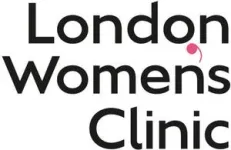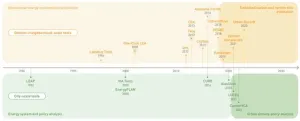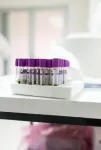(Press-News.org) 18 July 2024: Britain’s largest ever study of egg freezing which followed up the outcome of almost 30,000 eggs frozen at the London Women’s Clinic shows that success rates are comparable to those achieved by routine IVF and subject to the same variables of female age and embryo quality.(1) When seen alongside other similar large-scale egg-freezing studies from other countries, the results of this study add to a pattern of success which is consistent, predictable and reliable.
The study, published today in the peer-reviewed journal Reproductive Biomedicine Online, analysed the outcomes of treatment for 299 patients who had frozen their eggs between 2008 and 2022 and returned to thaw them for fertilisation and pregnancy. The results of this 15-year study found an overall live birth rate per embryo transfer of 26% which varied according to the age at which the eggs were frozen, with a lower rate in over-35s but only 5% in over-40s.
The cumulative live birth rate after the transfer of all embryos created from the thawed eggs was 34%, rising to 45% in those who had frozen their eggs before the age of 36.
‘These are results comparable with those nationally recorded in routine IVF,’ said Professor Nick Macklon, senior author of the study and Medical Director of the London Women’s Clinic. ‘The results are also comparable with those reported from other similar studies in the USA, suggesting that the doubts still commonly expressed about the reliability of egg freezing are misplaced. Taken together, the results appear consistent, predictable and reassuring.’(2)
What has this and other studies told us so far:
The number of women seeking egg-freezing treatment for personal reasons is increasing; in this single-centre study annual patient numbers rose from 150 women in 2015 to more than 800 in 2022.
However, the number of women returning to thaw their frozen eggs remains quite low and steady; only 299 of 2171 patients freezing their eggs returned and completed 332 thaw treatment cycles. Thus, the return rate was 14%, a rate similar to that found in other studies.
Overall, around one quarter of those who fertilised their thawed eggs and transferred them as ‘fresh’ embryos had a baby; the overall cumulative live birth rate, calculated from further frozen embryo transfers was 36% (and 57% in patients who had stored their eggs when aged under 35).
When all eggs were thawed, fertilised and embryos frozen (‘freeze-all’), live birth rate reached 30% for each frozen/thawed embryo transfer.
The success rate in freeze-all cycles was considerably improved for those who chose to have their embryos screened for chromosome abnormalities (PGT-A). Indeed, across all ages the use of PGT-A was associated with a live birth rate double that found with freeze-all treatments with an untested embryo (40% vs 21%). Indeed, all live births in women aged 40 or over were from an embryo which had been screened as chromosomally normal.
The mean age at which the ‘thaw’ patients froze their eggs was 37.6 years; the age at which they returned to thaw and use their eggs was 40 years with an overall average storage period of 24 months.
‘These are encouraging results for those considering freezing their eggs for future use,’ said Professor Macklon. ‘Current consensus based on these and other results would be that 10 to 15% of patients who originally froze their eggs in their later thirties will return to thaw and use them when they are, on average, between 40 and 42 years old.’
The results also challenge the sceptical perception of egg freezing, which may arise from dated studies. The UK regulator, the Human Fertilisation and Embryology Authority (HFEA), for example, recently warned that ‘when looking at success rates for frozen eggs, numbers tend to be quite low’. However, the results from this large study reflect outcomes which are robustly recorded and analysed, and comparable with those of fresh single embryo transfers in IVF when age and egg quality and quantity are taken into account.
‘It thus seems reasonable to conclude,’ said Professor Macklon, ‘that based on these results and those of other studies egg freezing and thawing can provide a very real opportunity for women to achieve pregnancy and live birth at a time of their choosing. With consistency in results, patient expectations can be managed similarly to all IVF treatments. An assessment of age and embryo quality can help estimate the potential outcomes of treatment.’
Notes
Shah T, Garratt J, Mclaughlin A, et al. Clinical outcomes of vitrified-warmed autologous oocyte cycles with 15-year follow-up at a single UK centre: consistent and predictable results. Reprod Biomed Online 2024; https://doi.org/10.1016/j.rbmo.2024.104376
For comparative purposes, the results of this study were analysed alongside two others:
- Blakemore JK, Grifo JA, DeVore SM, et al. Planned oocyte cryopreservation - 10-15-year follow-up: return rates and cycle outcomes. Fertil Steril 2021; 115: 1511–1520. https://doi.org/10.1016/j.fertnstert.2021.01.011
- Kawwass JF, Crawford S, Hipp HS. Frozen eggs: national autologous oocyte thaw outcomes. Fertil Steril 2021; 116: 1077–1084. https://doi.org/10.1016/J.FERTNSTERT.2021.05.080
National statistics from the UK, as reported by the HFEA, describe egg and embryo storage cycles as ‘the fastest growing fertility treatments in the UK’, adding that egg freezing treatments increased from 373 cycles in 2011 to 4215 cycles in 2021. The technique has been facilitated by improvements in freezing technology and the uptake of fast-freezing vitrification. Ice crystal formation in earlier slow-freezing methods was found to cause damage to cells; survival rates from vitrified/thawed have been found above 90% in recent studies. Studies suggest there are two principal reasons for egg freezing: to preserve fertility ahead of toxic treatment such as chemotherapy; and electively to postpone the opportunity for pregnancy to a later date
* RBM Online, founded by Professor Sir Robert Edwards in 2000, is a monthly peer-reviewed journal covering the full range of human reproductive health and disease, including basic and translational science, embryology, ART, infertility, male reproduction, periconception and pregnancy, reproductive health and the social implications of fertility care.
* For more information on this press release and the published paper, please contact:
Duncan Nicholas, RBM Online Development Editor
dev.editor@rbmonline.com
https://linktr.ee/rbmo
END
Egg freezing: Britain’s largest ever study reports live birth outcomes comparable to those of routine IVF
Findings from a London clinic-based study add to a pattern of consistent, predictable and reliable success.
2024-07-18
ELSE PRESS RELEASES FROM THIS DATE:
Assessment methods for realizing digital urban planning and low-carbon urban design
2024-07-18
With the promotion of carbon neutrality and carbon peaking goals, the construction of low-carbon cities and related quantitative assessments have become hot topics in the field of urban planning and design. The Intergovernmental Panel on Climate Change (IPCC) points out that the net emissions of anthropogenic greenhouse gases have continued to rise over the past decade, with the average annual emissions higher than any previous decade. Without additional climate change mitigation policies, global warming could lead to a temperature increase of 3.5°C ...
The courtship of leopard seals off the coast of South America
2024-07-18
A pioneering study led by Baylor University biologist Sarah Kienle, Ph.D., and published in the journal Polar Biology has unveiled the first paired observations of sexual behavior and vocalizations in wild leopard seals. Supported by a grant from the National Science Foundation, Kienle and her team’s third published study on the mysterious leopard seal represents a major advance in understanding the behavior of one of the most difficult apex predators to study on Earth.
Key findings from the study
Kienle and her team observed a two-hour courtship interaction between a male and female leopard seal in Laguna San Rafael, Chile, and documented a range of behaviors ...
Improving HIV treatment in children and adolescents – the right way
2024-07-18
Globally, around 2.6 million children and adolescents are currently living with HIV, the majority of them in Africa. These young people are much more likely to experience treatment failure than adults. Experts long assumed that testing for viral drug resistance could improve treatment in cases where treatment has failed. However, a research team led by the University of Basel, Switzerland, now shows that it is much more important to support patients in taking their medication regularly.
The fight against HIV has made great strides over the past few decades. Antiretroviral drugs keep the virus at bay, preventing ...
Substantial rise in adults vaping for longer than 6 months, especially in young adults
2024-07-18
The number of adults in England who report vaping for more than six months has increased substantially from around one in 80 in 2013 to one in 10 in 2023, finds a study published by The BMJ today.
Much of this increase has occurred since 2021, coinciding with the rapid rise in popularity of disposable e-cigarettes, especially among young adults, including those who had never regularly smoked, the results show.
It was already established that vaping rates have increased substantially in England since new disposable e-cigarettes became ...
No increased risk of birth defects after covid-19 infection or vaccination in early pregnancy
2024-07-18
Neither covid-19 infection nor vaccination during the first trimester of pregnancy is associated with increased risk of major birth defects, finds a study from Scandinavia published by The BMJ today.
It’s well known that women who experience covid-19 infection during pregnancy are at increased risk of severe illness and have a higher risk of complications, including preterm birth and stillbirth.
Less clear is the risk of birth defects (congenital anomalies) after infection with or vaccination against covid-19 as it has only recently become ...
Trusted TV doctors “deepfaked” to promote health scams on social media
2024-07-18
Some of the UK’s most recognisable TV doctors are increasingly being “deepfaked” in videos to sell scam products across social media, finds The BMJ today.
Trusted names including Hilary Jones, Michael Mosley and Rangan Chatterjee are being used to promote products claiming to fix high blood pressure and diabetes, and to sell hemp gummies, explains journalist Chris Stokel-Walker.
Deepfaking is the use of artificial intelligence (AI) to map a digital likeness of a real-life human being onto a video of a body that isn’t theirs. Reliable evidence on how ...
Singing the science: Using karaoke to examine blushing
2024-07-18
A new collaboration between researchers from the Netherlands Institute for Neuroscience, the University of Amsterdam and the University of Chieti explores the neural substrates of blushing in a MRI scanner.
Most of us know what it feels like to blush. The face becomes warm and red, and we experience self-conscious emotions, such as embarrassment, shyness, shame, and pride. It is perhaps no wonder that Charles Darwin referred to it as “the most peculiar and the most human of all expressions”. But why do we blush, and what ...
Data protection laws reduced breaches but affected firms’ value
2024-07-18
The introduction of new data protection rules significantly reduced breaches by firms but negatively impacted their market value, according to new research by the University of East Anglia (UEA) and University of Texas.
Researchers looked at what happened when the European Union’s General Data Protection Regulation (GDPR) started being enforced in 2018. Using its extraterritorial reach, the authors explore variation in US firms’ exposure to the EU GDPR to see how stricter data privacy laws affected their value, ...
Landmark study shows elevated cancer risk for women with endometriosis
2024-07-17
A landmark study from researchers at Huntsman Cancer Institute at the University of Utah (the U), the Spencer Fox Eccles School of Medicine at the U, and Boston University Chobanian & Avedisian School of Medicine found that women with severe endometriosis are 10 times more likely to get ovarian cancer, compared to women who do not have the disease.
Prior studies have shown a causal connection between endometriosis and ovarian cancer. But in using the Utah Population Database—a repository of linked health records housed at Huntsman ...
Lichtenberg earns GSA’s 2024 Donald P. Kent Award
2024-07-17
The Gerontological Society of America (GSA) — the nation’s largest interdisciplinary organization devoted to the field of aging — has chosen Peter Lichtenberg, PhD, ABPP, FGSA, of Wayne State University as the 2024 recipient of the Donald P. Kent Award.
This distinguished honor is given annually to a GSA member who best exemplifies the highest standards for professional leadership in gerontology through teaching, service, and interpretation of gerontology to the larger society. It was established in 1973 in memory of Donald P. Kent, PhD, for his outstanding leadership in translating research findings ...
LAST 30 PRESS RELEASES:
Don’t Panic: ‘Humanity’s Last Exam’ has begun
A robust new telecom qubit in silicon
Vertebrate paleontology has a numbers problem. Computer vision can help
Reinforced enzyme expression drives high production of durable lactate-based polyester
In Rett syndrome, leaky brain blood vessels traced to microRNA
Scientists sharpen genetic maps to help pinpoint DNA changes that influence human health traits and disease risk
AI, monkey brains, and the virtue of small thinking
Firearm mortality and equitable access to trauma care in Chicago
Worldwide radiation dose in coronary artery disease diagnostic imaging
Heat and pregnancy
Superagers’ brains have a ‘resilience signature,’ and it’s all about neuron growth
New research sheds light on why eczema so often begins in childhood
Small models, big insights into vision
Finding new ways to kill bacteria
An endangered natural pharmacy hidden in coral reefs
The Frontiers of Knowledge Award goes to Charles Manski for incorporating uncertainty into economic research and its application to public policy analysis
Walter Koroshetz joins Dana Foundation as senior advisor
Next-generation CAR-T designs that could transform cancer treatment
As health care goes digital, patients are being left behind
A clinicopathologic analysis of 740 endometrial polyps: risk of premalignant changes and malignancy
Gibson Oncology, NIH to begin Phase 2 trials of LMP744 for treatment of first-time recurrent glioblastoma
Researchers develop a high-efficiency photocatalyst using iron instead of rare metals
Study finds no evidence of persistent tick-borne infection in people who link chronic illness to ticks
New system tracks blockchain money laundering faster and more accurately
In vitro antibacterial activity of crude extracts from Tithonia diversifolia (asteraceae) and Solanum torvum (solanaceae) against selected shigella species
Qiliang (Andy) Ding, PhD, named recipient of the 2026 ACMG Foundation Rising Scholar Trainee Award
Heat-free gas sensing: LED-driven electronic nose technology enhances multi-gas detection
Women more likely to choose wine from female winemakers
E-waste chemicals are appearing in dolphins and porpoises
Researchers warn: opioids aren’t effective for many acute pain conditions
[Press-News.org] Egg freezing: Britain’s largest ever study reports live birth outcomes comparable to those of routine IVFFindings from a London clinic-based study add to a pattern of consistent, predictable and reliable success.






